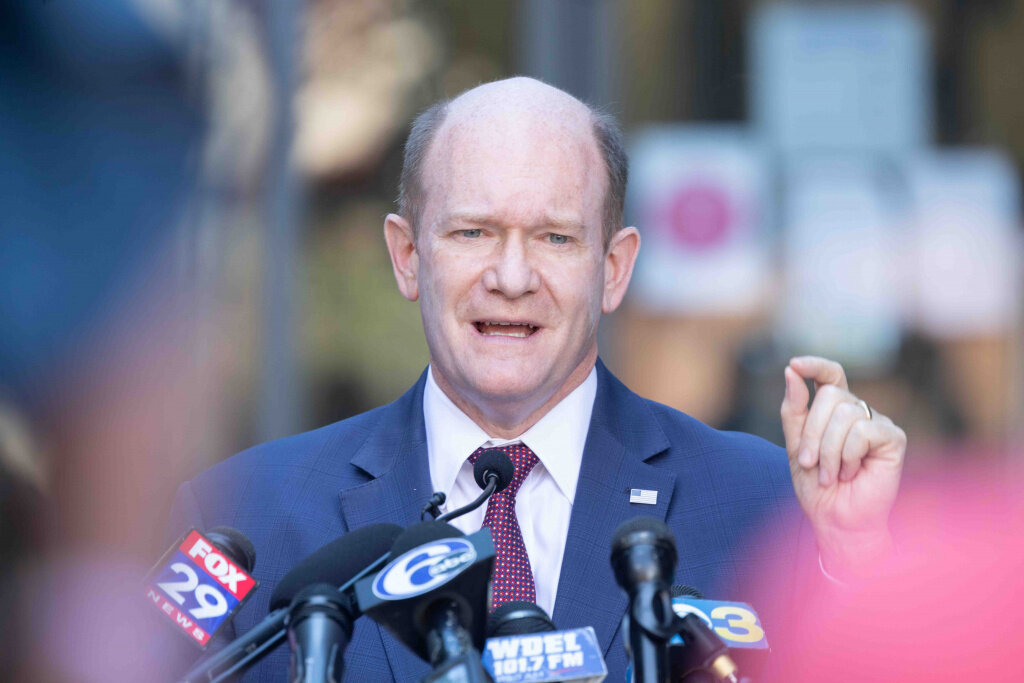Sen. Coons applauds President Biden’s American Jobs Plan
March 31, 2021
The $2 trillion American Jobs Plan includes several of Senator Coons’ initiatives, including his bill to develop carbon capture and storage infrastructure, the establishment of a Civilian Climate Corps, Amtrak improvements, and more
WILMINGTON, Del. – U.S. Senator Chris Coons (D-Del.) released the following statement on President Biden’s American Jobs Plan, announced this afternoon.
“I applaud President Biden’s plan to create millions of good-paying jobs, rebuild American infrastructure – our bridges and railways, electric grids and water systems – and invest in a clean energy future. With this plan, we will help Americans get back to work, stimulate our economy, and finally address the impacts of climate change,” said Senator Coons. “I’m pleased that the American Jobs Plan includes economic and climate initiatives that I’ve worked on in the Senate, including the bipartisan SCALE Act, the establishment of a Civilian Climate Corps, funding for Amtrak, support for R&D to boost our future competitiveness, and much more. I look forward to working with the Biden administration and my colleagues on both sides of the aisle to pass into law this historic package, so we can rebuild the American economy in a way that makes the U.S. more competitive and creates jobs for American workers.”

File Photo: Senator CHRIS COONS (D-Del.) gives remarks during a press conferences on the topic of the Postal Service being sabotage Tuesday, Aug 18, 2020, at the Wilmington Post Office at 500 Delaware Ave in Wilmington, DE. Photo By Saquan Stimpson
Sen. Coons is pleased the American Jobs Plan includes:
- The Storing CO2 and Lowering Emissions (SCALE) Act [coons.senate.gov], legislation introduced by Sens. Coons and Bill Cassidy (R-La.), that will help develop carbon capture and storage (CCS) infrastructure as a critical means of reducing emissions of CO2 – or carbon dioxide, a greenhouse gas – while creating regional economic opportunities and jobs.
- $80 billion for Amtrak over eight years. Last week, Sens. Coons and Chris Murphy (D-Conn.) led a group of 12 other senators from states along the Northeast Corridor (NEC) in a letter [coons.senate.gov] urging President Biden to support $55 billion in long-term funding for passenger rail infrastructure in order to repair the NEC rail network. The letter also called for robust support to expand Amtrak passenger rail service nationwide.
- The establishment of a new Civilian Climate Corps that will mobilize the next generation of conservation and resilience workers. The proposal is in line with legislation being announced in the coming days by Sens. Coons, Martin Heinrich (D-N.M.), and Ben Ray Luján (D-N.M.) and Reps. Joe Neguse (D-Colo.) and Abigail Spanberger (D-Va.) to authorize the administration to utilize existing national service programs and coordinate with federal and non-federal entities to create a Civilian Climate Corps.
- $14 billion to the National Institutes for Standards and Technology (NIST) to advance technologies and capabilities critical to future competitiveness. Sen. Coons authored legislation [coons.senate.gov] enacted in 2020 that authorizes the expansion of NIST’s Manufacturing USA network, which includes the National Institute for Innovation in Manufacturing Biopharmaceuticals, or NIIMBL, headquartered in Newark, Delaware.
- Funding for the Weatherization Assistance Program that helps to upgrade homes and reduce energy costs for low-income families. Sen. Coons was the lead sponsor of the Weatherization Enhancement and Local Energy Efficient Investment and Accountability Act of 2019 [coons.senate.gov], which reauthorized and updated the program, that passed Congress in December as part of the Energy Act of 2020.
- $30 billion over four years to protect from future pandemics. Sen. Coons introduced the bipartisan National Guard Manufacturing Act of 2021 [coons.senate.gov], along with Sens. Marco Rubio (R-Fla.), Maggie Hassan (D-N.H.), and John Cornyn (R-Texas), to invest in the ability of the U.S. government to mitigate future supply chain emergencies.
- $30 billion for increased R&D, including innovation, at the Department of Energy. Through his role on the Senate Appropriations Committee, Sen. Coons has secured funding for programs that spur innovation at the Department of Energy each year.
- The creation of more registered apprenticeships, with a focus on expanding the diversity of workers who get them. Sen. Coons, along with Sen. Todd Young (R-Ind.), introduced the Apprenticeship Hubs Across American Act [coons.senate.gov] to expand the highly successful registered apprenticeship model to high-growth job sectors. The bill would establish a new initiative at the U.S. Department of Labor to expand highly successful Apprenticeship Hubs, which are organizations that help employers design, develop, and deliver Registered Apprenticeship Programs.
- $35 billion for climate science, innovation, and R&D, including funding demonstration projects for carbon capture and storage and advanced nuclear. This funding is in line with the Launching Energy Advancement and Development through Innovations for Natural Gas (LEADING) Act of 2019 [coons.senate.gov], legislation introduced by Sens. Coons, John Cornyn (R-Texas), and Kyrsten Sinema (D-Ariz.), as well as the Nuclear Energy Renewal Act [coons.senate.gov], which Sen. Coons sponsored along with Sen. Martha McSally (R-Ariz.). Both bills passed into law as part of the Energy Act of 2020.
- At least $20 billion for research infrastructure and R&D at historically black colleges and universities (HBCUs) and minority-serving institutions, as well as $15 billion for up to 200 centers of excellence that would serve as research incubators at those institutions. Sen. Coons is a co-chair of the bipartisan, bicameral HBCU caucus.
- $30 billion over four years to improve and expand medical countermeasure manufacturing domestically. Sen. Coons has been a consistent advocate for funding to support innovation and capacity in the manufacturing of biopharmaceuticals like vaccines.
- The creation of at least 10 regional innovation hubs. Sen. Coons, along with Sen. Dick Durbin (D-Ill.), introduced the Innovation Centers Acceleration Act [coons.senate.gov], which would expand R&D, targeted to reach a broader portion of the country. The legislation would complement a nationwide effort to compete with China economically by placing renewed emphasis on sectors key to economic resiliency and productivity, including biomedical technology, advanced manufacturing, and more.

